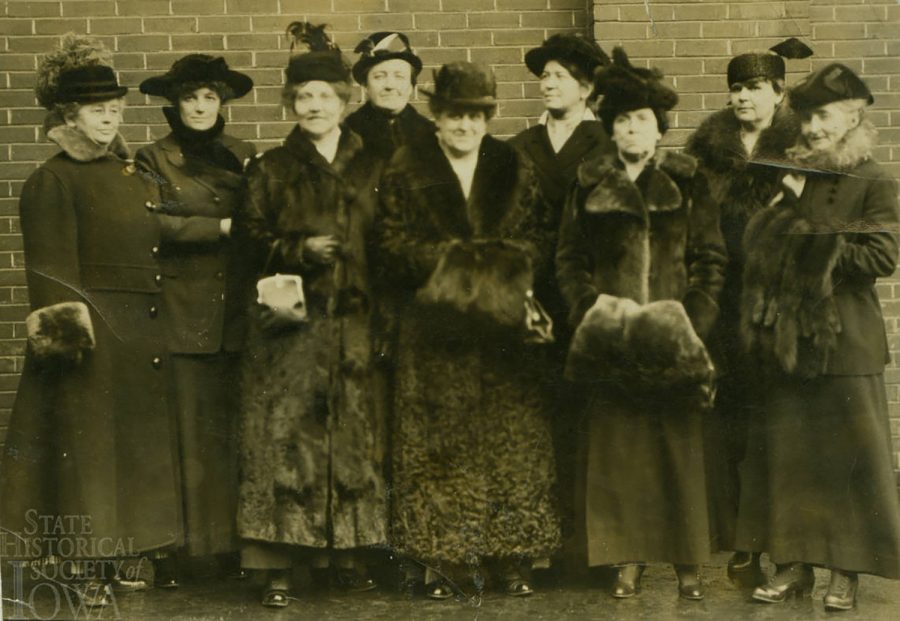UI holds year-long commemoration for the 100th anniversary of the 19th amendment
Non-profit 50-50 in 2020 and the Dean of Tippie bring classes and speakers to UI for the 100th anniversary of the 19th amendment.
October 17, 2019
With the turn of a new decade, the 100th anniversary of when women won the right to vote approaches, sparking a campus-wide discussion about modern voting rights and the true message behind the first modern women’s rights movement.
For the 2019-20 academic year, 50-50 in 2020, a nonprofit fighting for political equity for women in Iowa, is bringing their campaign “Hard Won. Not Done.” to the University of Iowa.
With the assistance of 50-50 in 2020 and the League of Women Voters, Tippie College of Business Dean Sarah Gardial orchestrated a group of faculty leadership and staff from different departments to create the “Hard Won. Not Done.” program. The program includes a series of fall and spring semester courses, several speakers, and a writing contest.
“The important thing is we’re in Iowa, and we’re a huge political state,” Gardial said. “Caucuses and voter rights are just very big in the state. There is a larger group of women on campus who want to use the 100th anniversary as a platform for the ‘we’re not done’ piece.”
Visiting Assistant Professor in the UI History Department Caroline Radesky said the anniversary serves as a reminder of the exclusivity of early feminism and the impact the agenda still has 100 years later. As a part of the series, Radesky currently teaches “Women’s Right to Vote: A History of American Suffrage and Early Feminism,” a one-time class that shines light on the original women’s rights movement.
The first women’s rights movement only focused on the rights of white women and attempted to erase women of color from the narrative, Radesky said. Radesky’s class will be working with the Library of Congress in Washington, D.C. to bring the women of color that were a part of the early feminist movement back into the spotlight. The students will transcribe documents from the early 1900s, providing more comprehensive language.
RELATED: Stacey Abrams will visit the UI to speak about fair elections
“So many people don’t have the right to vote in our nation,” she said. “There’s a lot more work that needs to be done.”
Radesky said she hopes that, by pushing back and revealing the original motive of the first women’s movement, the feminist culture of today can avoid a repeat of history. When voting rights are enfranchised or blocked from certain people, Radesky said she sees similarities between the foundation of the original women’s movement and today’s movement.
Professor Leslie Schwalm, Assistant Professor Ashley Howard, and Associate Professor Steve Warren are set to teach the spring sessions of the series’ classes. The set of courses covers topics such as current and past voting rights, African American women in history, and the history of Iowa and the Midwest.
The “Hard Won. Not Done.” campaign will bring Stacey Abrams, the founder of election reform and voter protection organization Fair Fight, to the IMU Nov. 4.
“We are very excited that Stacey Abrams will be visiting campus as part of the commemoration series this month,” Women’s Resource and Action Center Program Developer Laurie Haag said. “We definitely support the work that she and others are doing to ensure voting equity and access to all.”
The Women’s Resource and Action Center recently partnered with University of Iowa Student Government and Hawk the Vote to educate and register students on campus. Women’s Resource and Action Center members also started advocating for the addition of expiration dates on student IDs, which would allow students to use their Iowa IDs as a valid ID to cast a ballot and register to vote, Haag said. The volunteers hope to eventually expand voting rights to people who have been incarcerated in the state of Iowa, she said.
“[We have] the ability to tie something that is historical and very important part of women history to something that is a very modern day for migrants, felons and others,” Gardial said.














